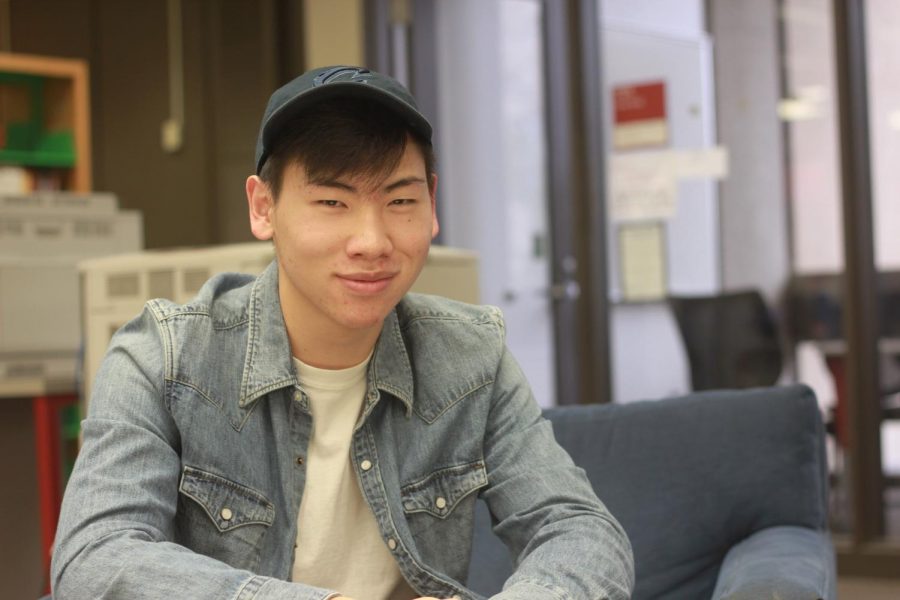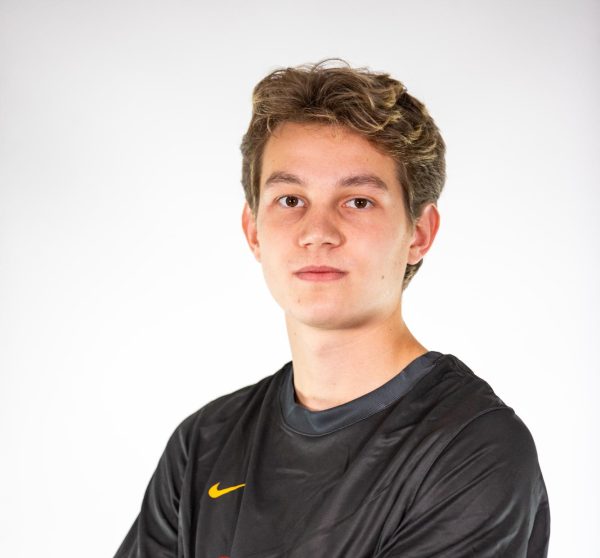In The Locker Room with Sean Kuo, College Junior, Fencer, Club Sport Athlete, and Pre-Med Student
Sean Kuo
While “In The Locker Room” interviews often focus on members of the Oberlin community associated with varsity athletics, College junior Sean Kuo is a prime example of the flexibility and fun that can be found through participating in Oberlin’s many club sports and activities. Kuo’s friendly presence and love for exercise make regular appearances at nearly five clubs around campus; primarily the club fencing team, Club Aikido, and the Movimiento dance crew — all while he majors in Biology, pursues the pre-med track, and works as a course writing associate. With all this going on, it is no surprise that Kuo often finds himself floating between many different groups of people at Oberlin. In the midst of all this chaos, though, Kuo purely enjoys his extracurriculars and has a deep appreciation for the community they have fostered.
This interview has been edited for length and clarity.
You are an active member of the fencing team — can you tell me a little bit about fencing and how you discovered it?
I started fencing last year during spring semester. I was at the ExCo fair and I saw the fencing ExCo. And I was like, “Wow, this scene is pretty cool.” So I signed up for it, and over the course of the ExCo I found out that I was actually not too bad and I had a lot of fun doing it — I loved the community. Eventually, I just became a member of the club. I continue to be a part of the club. I’m the secretary now and go to multiple tournaments. I didn’t really win that much, but it’s still a lot of fun.
So you learned how to fence only recently? Do you enjoy it?
Yeah, I do. I mean, come on. It’s just a big, fun time of people stabbing each other.
Maybe on your end, if you’re stabbing the other person.
It is a little bit more of a one-sided affair. So when I started learning to fence, it was a little bit confusing because fencing has three different weapons. There is the foil, épée, and the saber, all of which have different rules. In the ExCo we started with the foil, which is the one that’s most technical. There’s a certain target area that you have to hit and there’s a lot of different concepts involved. There’s a lot of different rules involved as well. You need to understand [them] in order to understand the point system. It’s not too hard to learn. But when you start getting more involved into it, you realize just how easy it is to mess up a call or see something in a different way than everyone else.
And how is it different from the other activities that you do? You play soccer, you dance, and you practice Aikido.
It definitely involves a lot of stabbing. And it’s very different because, in most of the sports, I’m not using other equipment besides my hands and my feet. In that aspect it just feels really different, but in a good way.
Is it a particularly emotional sport? Because you’re using aggressive, but simultaneously intimate, movements?
It’s pretty emotional, especially when it comes down to the last few touches before the match is over. Especially in saber, you’ll see people screaming as soon as they get a touch [against their opponent] because it also is a way to convince the referee. It’s pretty emotional when you are just about to win.
Fencing could not be more different from dance. How did you fall into that?
So I actually just started getting into dance last summer. I went to a dance club at [the University of California at Santa Barbara]. [My friend] asked me if I wanted to go. So I was like, “Sure, why not? It’ll be interesting.” And from there, obviously it was a steep learning curve for me because they’re all amazing dancers, but I thought it was really fun. It’s a really good way to connect with people, especially because the community around my area [loves dance]. It’s always funny when my neighbor invites me over and I break out the moves. He’s always like, “Wow, this kid is amazing.” And eventually I came over here and I was exploring the dance clubs [at the Club Fair]. I heard music and was like, “Oh, that music sounds like salsa.” I see my friend over there and ask, “Hey Danny, is that salsa?” And he was like, “Yeah man,” and I just started moving to it.
I feel like in college a lot of people get stuck into the routine that they develop. You are always looking for new things to do and explore. How do you break out of the confines of routine?
Well, I don’t know actually. I just saw things that looked interesting to me. I’m a very whimsical person, so when I see something that looks interesting, I just want to fall right into it.
It sounds like there’s also a social aspect to your activities, or a nice community.
Yeah, I would say so. I got a lot of different friend groups from those. It really helps me connect with others because I’m also not exactly the most social person outside of, maybe, a party. So yeah, it really helped me find the friends and people who have similar interests to me.
What is it like being a biology major and on the pre-med track in addition to everything you do outside of academics?
It’s very tough, especially with the things that I have to do every single week. I have fencing practice, I have dance practice. I have a lot of meetings because I’m the secretary of the fencing team now, and I have my own job as a course writing associate. It’s definitely harder to manage. It’s not impossible. I’ve definitely seen people who do way more stuff. Shout-out to my friend Ritesh [Isuri, College junior]. It’s difficult to juggle. I’m sure it would be a lot easier if I dropped a couple of activities, but I’m just really stubborn. I think that’s maybe one of the reasons why I’m still able to go on this track.










